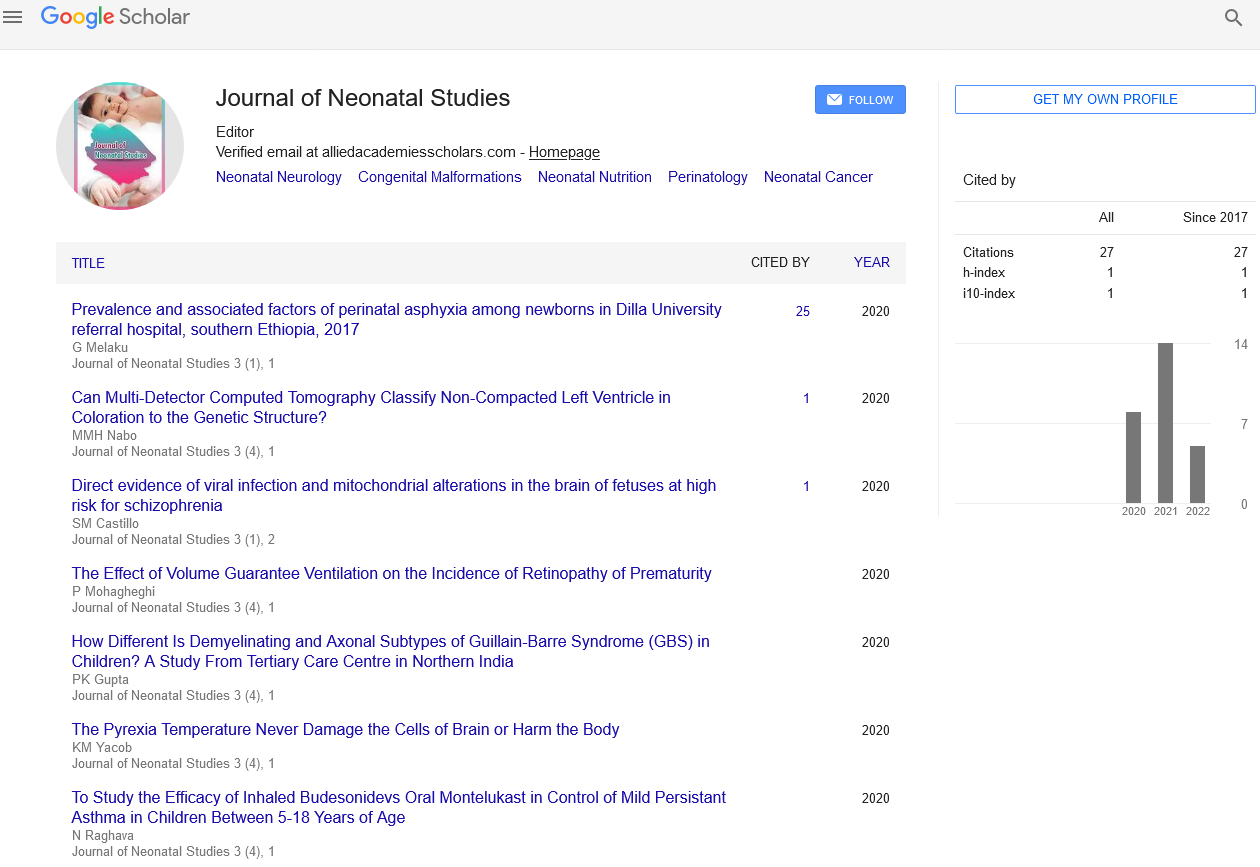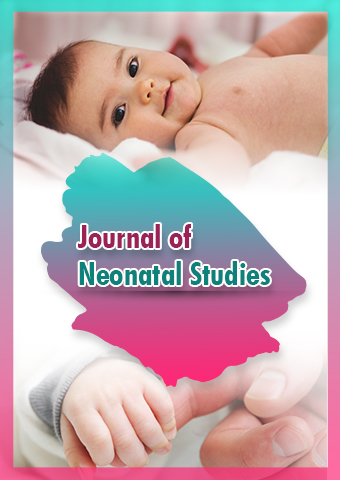Perspective - Journal of Neonatal Studies (2024) Volume 7, Issue 2
Understanding and Addressing Neonatal Discomforts: A Comprehensive Guide
- Corresponding Author:
- Hinata Minato
Department of Neonatology Research, Ateneo de Manila University School of Medicine and Public Health, Philippines
E-mail: hinata_minato@terumobct.com
Received: 01-Mar-2024, Manuscript No. JNS-24-130010; Editor assigned: 04-Mar-2024, PreQC No. JNS-24-130010 (PQ); Reviewed: 18-Mar-2024, QC No. JNS-24-130010; Revised: 02-Apr-2024, Manuscript No. JNS-24-130010 (R); Published: 09-Apr-2024, DOI: 10.37532/JNS.2024.7(2).205-206
Introduction
The birth of a newborn is a momentous occasion, marking the beginning of a journey filled with love, care, and nurturing. However, along with the joys of parenthood come the challenges of understanding and managing the various discomforts that infants may experience in their earliest days of life. From minor irritations to more serious conditions, neonatal discomforts require attention, compassion, and informed medical care. In this comprehensive guide, we delve into the world of neonatal discomforts, exploring their causes, symptoms, treatments, and strategies for providing comfort and relief to newborns and their caregivers.
Description
Understanding neonatal discomforts
Neonatal discomforts refer to a range of physical and physiological issues that can cause distress or discomfort in newborn infants. These discomforts can arise from a variety of factors, including the transition to extrauterine life, immature organ systems, environmental stimuli, and underlying medical conditions. While many neonatal discomforts are temporary and resolve on their own with time and supportive care, others may require medical intervention to address effectively.
Common neonatal discomforts
Feeding difficulties: Many newborns experience challenges with feeding, including difficulties with latching, sucking, swallowing, and digesting breast milk or formula. These issues can lead to fussiness, crying, and inadequate weight gain if not addressed promptly.
Colic: Colic is a common condition characterized by excessive, inconsolable crying in otherwise healthy infants. The exact cause of colic remains unclear, but factors such as gas, immature digestive systems, and overstimulation may contribute to its onset.
Gastrointestinal upset: Newborns are susceptible to gastrointestinal issues such as gas, reflux, and constipation, which can cause discomfort and distress. These problems may stem from immature digestive function, feeding issues, or underlying medical conditions.
Skin irritations: Skin irritations, including diaper rash, eczema, and cradle cap, are common in newborns due to factors such as sensitive skin, friction, moisture, and exposure to irritants. Proper skincare and gentle remedies are essential for soothing these discomforts and promoting healthy skin.
Sleep disturbances: Newborns typically have erratic sleep patterns, waking frequently throughout the night for feedings, diaper changes, and comfort. However, excessive fussiness, restlessness, or difficulty settling to sleep may indicate underlying discomfort or medical issues.
Teething discomfort: While teething typically begins around six months of age, some infants may experience teething discomfort earlier, manifesting as irritability, drooling, gum sensitivity, and disrupted sleep. Providing safe teething remedies can help alleviate these symptoms and soothe the infant.
Addressing neonatal discomforts
Comfort measures: Providing comfort to a distressed newborn involves gentle handling, swaddling, rocking, and soothing sounds or motions. Skin-to-skin contact with the caregiver can also promote a sense of security and calmness for the infant.
Feeding support: Breastfeeding mothers may benefit from seeking guidance from lactation consultants or healthcare providers to address feeding difficulties and ensure proper positioning and latch. For formula-fed infants, choosing appropriate formulas and feeding techniques can help alleviate digestive discomforts.
Gentle gastrointestinal relief: For infants experiencing gastrointestinal upset, strategies such as burping after feedings, gentle tummy massages, and using anti-gas drops or gripe water may provide relief. However, it’s essential to consult with a pediatrician before introducing any new remedies or supplements.
Skin care and protection: To prevent and manage skin irritations, caregivers should practice regular diaper changes, use gentle cleansers and moisturizers, and provide diaper-free time to allow the skin to breathe. Barrier creams or ointments can create a protective barrier against moisture and irritants.
Sleep hygiene: Establishing a calming bedtime routine and creating a conducive sleep environment can help newborns develop healthy sleep habits. Dimming lights, minimizing noise and stimulation, and maintaining a comfortable room temperature can promote restful sleep for both infants and caregivers.
Teething relief: Safe teething remedies, such as teething rings, chilled washcloths, or over-the-counter teething gels formulated for infants, can help alleviate gum discomfort associated with teething. However, caregivers should closely supervise infants during teething relief measures to prevent choking hazards.
Medical interventions
While many neonatal discomforts can be managed with supportive care and home remedies, some may require medical evaluation and treatment. It’s essential for caregivers to recognize when a newborn’s discomfort warrants professional attention and to seek prompt medical care from a pediatrician or healthcare provider. Medical interventions for neonatal discomforts may include:
Medications: In certain cases, pediatricians may prescribe medications to alleviate symptoms or treat underlying conditions contributing to neonatal discomforts. These medications may include antacids for reflux, stool softeners for constipation, or topical treatments for skin irritations.
Diagnostic tests: If a newborn’s discomfort persists or is accompanied by concerning symptoms, healthcare providers may recommend diagnostic tests such as blood tests, imaging studies, or specialized procedures to identify the underlying cause of the discomfort.
Referral to specialists: In complex cases or when underlying medical conditions are suspected, pediatricians may refer newborns to pediatric specialists, such as pediatric gastroenterologists, dermatologists, or allergists, for further evaluation and management.
Conclusion
Neonatal discomforts are a common yet challenging aspect of caring for newborn infants. By understanding the causes, symptoms, and appropriate management strategies for neonatal discomforts, caregivers can provide compassionate and effective care to promote the well-being and comfort of their newborns. From addressing feeding difficulties and gastrointestinal upset to managing skin irritations and teething discomfort, proactive and informed caregiving plays a vital role in supporting the health and development of newborns during this critical stage of life.
As caregivers navigate the joys and challenges of parenthood, it’s essential to seek support from healthcare professionals, trusted resources, and community networks to ensure that newborns receive the comprehensive care and attention they need to thrive. With patience, empathy, and a commitment to promoting comfort and well-being, caregivers can create a nurturing environment where newborns feel safe, loved, and cherished as they embark on their journey of growth and discovery.

